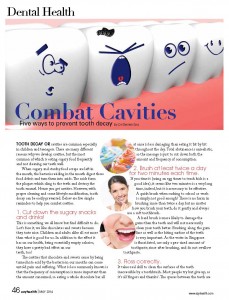 This article first appeared in the May 2014 issue of Ezyhealth magazine. We have reproduced it for the information of those of you who missed it when it was published.
This article first appeared in the May 2014 issue of Ezyhealth magazine. We have reproduced it for the information of those of you who missed it when it was published.
Tooth decay or cavities are common especially in children and teenagers. There are many different reasons why we develop cavities, but the most common of which is eating sugary food frequently and not cleaning our teeth well.
When sugary and starchy food scraps are left in the mouth, the bacteria residing in the mouth digest these food debris and turn them into acids. The acids form the plaques which cling to the teeth and destroy the tooth enamel. Hence you get cavities. However, with proper cleaning and some lifestyle modification, tooth decay can be easily prevented. Below are five simple reminders to help you combat cavities.
1. Cut down the sugary snacks and drinks!
This is something we all know but find difficult to do. Let’s face it, we like chocolates and sweets because they taste nice. Children and adults alike all eat more than what is good for us. In addition to the effect it has on our health, being essentially empty calories, they have a pretty bad effect on our teeth, too!
The cavities that chocolates and sweets cause by being turned into acid by the bacteria in our mouths can cause untold pain and suffering. What is less commonly known is that the frequency of consumption is more important than the amount consumed, so eating a whole chocolate bar all at once is less damaging then eating it bit by bit throughout the day. Total abstinence is unrealistic, so the message is just to cut down both the amount and frequency of consumption.
2. Brush at least twice a day for two minutes each time.
If you time it (using an egg timer to teach kids is a good idea) it seems like two minutes is a very long time indeed, but it is necessary to be effective. A quick brush when rushing to school or work is simply not good enough! There is no harm brushing more than twice a day, but no matter how you brush your teeth, do it gently and always use a soft toothbrush.
A hard brush is more likely to damage the gums than the teeth and will not necessarily clean your teeth better. Brushing along the gum line as well as the biting surface of the teeth is very important. As the water in Singapore is fluoridated, use only a pea-sized amount of toothpaste, rinse after brushing, and do not swallow toothpaste.
3. Flossing correctly
It takes real skill to clean the surfaces of the teeth inaccessible by a toothbrush. Most people try but give up, it’s all “fingers and thumbs”. The spaces between the teeth are the most likely place for cavities to develop, as food and plaque are sheltered here and cause the most damage.
If you have tried and failed with floss, then there are many inter-dental gadgets available from pharmacies in the form of tooth picks and inter-dental brushes. With practice you will become very proficient at cleaning these areas. Ask your dentist/pharmacist for advice.
4. Visit your dentist twice a year, once every 6 months.
This is something we all know we should do but don’t for many reasons, including fear of pain and fear of the dental bill! Dental cavities are almost entirely preventable so with good care, pain can be avoided and so can high dental charges.
The wrong thing to do is to visit the dentist only when you have a problem, as it is often too late. Absence of pain is not a good sign that there is nothing wrong, and only your dentist can detect cavities in the earliest stages even before they need filling. With simple treatment, the smallest cavities can remineralise and heal themselves.
5. Seal cavities early.
Cavities also develop in the fissures or grooves of the teeth, again being a sheltered area where plaque can do its damage. Prevent more cavities from developing by sealing out the decay. Resin coatings called fissure sealants can be very effective, especially in vulnerable children who have a high caries rate. These are not expensive to apply, and it is a painless procedure. The potential savings in future dental costs, including inconvenient time out from work/school and of course, avoidance of discomfort from injections and drilling, outweigh the initial investment in your teeth. Fissure sealants can also benefit adults – ask your dentist if they would be a good idea for you.
Your teeth can last a lifetime if proper maintenance of good oral health and habits are practiced.





